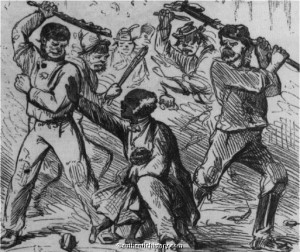By Gavroche Allen.
O, de next morning such condition our village
So late do seems of confusion, riot and pillage.
-Hard Scrabble, from an 1824 pamphlet
This 1824 broadside phrase illustrates the aftermath of a race riot that destroyed a predominately African-American community in Providence called Hard Scrabble. Few today know of the events that took place in this neighborhood nearly two centuries ago, but the riot that occurred there was a major controversy back in its day. This conflict illuminated the stark racial, social, and political divisions that split the town at that time.
The riot was sparked when a group of black men walking in Providence refused to give up the “inside walk” to a number of white individuals coming from the opposite direction on an autumn evening. The next night, on October 18, 1824, violence broke out. A mob of white residents from all parts of Providence attacked a section of North Main Street. About twenty African-Americans’ homes and that of one white resident were destroyed during the riot. Only four rioters were tried after the Hard Scrabble incident, and all but one was eventually acquitted.
Race, of course, played a huge part in the incident. Although Rhode Island contained one of the highest percentages of free blacks throughout the U.S., there was still a sharp racial divide, and at the time of the riot, suffrage was only allowed to white male land owners. A couple of days before the riot, Chief Justice William Spear contributed an editorial to the Providence Beacon in which he commented that blacks in Providence were “naturally vicious and wicked.” Before the riot, Hard Scrabble was known as that part of the city where people of “ill repute” resided; it was deemed a place plagued with “criminal elements.” It was no wonder, then, that Joseph Tillinghast, the defense attorney in the “Hard Scrabble Riot” trial, stated that the reason the accused caused such destructive mayhem to that section of Providence was that they were protecting “the morals of the community.”

Attacks by white rioters on African Americans occurred in many parts of the country. This is a contemporary depiction of the 1863 New York Draft Riot that occurred four decades after Providence’s Hard Scrabble riot. Photo from authentichistory.com
Racial violence unfortunately continued in Providence in later years. An integrated working-class community, Snow Town, was malevolently assaulted by white rioters in 1831 when a black resident shot and killed a white sailor for throwing stones at his home. The “Snow Town Riots” resulted in four whites being killed by the local militia. As a result of the tragic events of Snow Town, the General Assembly granted the town of Providence a city charter in November of 1831, giving the presiding mayor the power to imprison anyone who carried out any sort of disorderly conduct in the municipality.
After the Civil War, the memory of Hard Scrabble and Snow Town and the violence the residents there had endured began to fade away. Ironically, the shadow of the State House still falls upon the sites of this chapter in the city’s dark and almost forgotten past. Although both neighborhoods were cursed by rumors of crime and seedy activities, they also housed a vibrant working-class community composed of all races that lived together in harmony. While we shouldn’t forget the racial hatred and violence that marred this chapter in Providence’s history, we should also remember the diversity and solidarity that characterized our own 99% in these neighborhoods, too.
________________________________________________
